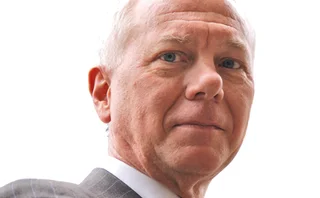
Haircut or fleecing ?
Despite a booming economic revival, the Argentine government refuses to budge on its stated intention of repaying bondholders only 25% of their original investments. Josh Goodman gauges the reaction of bondholders and the wider market

Argentina’s ongoing economic recovery, praised as “spectacular” by US Treasury under-secretary for international affairs John Taylor, is certainly good news for the shell-shocked nation. Last year GDP surged 8.7%, ending a four-year recession that saw the economy sink more than 20% and pushed half the country’s 37 million people into poverty. In March the economy kept cruising at a 10.4% speed, thanks to growing consumer demand, a booming industrial sector and high commodity prices.
The only thing disturbing the otherwise upbeat scenario is the nagging interference of the country’s bondholders. More than two years after the country defaulted on $90 billion in bonds, investors are becoming more vocal. With such an impressive macroeconomic performance, they argue there is no longer reason to keep crying for Argentina. “There’s no doubt their debt dynamics are better than they were even six months ago,” says Hans Humes, co-chair of the Argentina Global Bondholders Committee, which claims to represent about $35 billion in defaulted papers.
Like never before Argentina is sitting on a surfeit of dollars. Thanks to the recovery—which according to estimates should continue at a 5%–8% pace this year—its fiscal surplus was $1.1 billion during the first quarter, almost four times the target set by the International Monetary Fund (IMF). Despite the windfall, President Néstor Kirchner says he is unwilling to pay more than 25 cents for each dollar invested in the defaulted papers, terms considered unacceptable by creditors.
Despite the government’s resolute stance, there are signs that a compromise may be on the horizon. On April 16 Humes and the bondholder group he represents had their first face-to-face contact with officials from the Economy Ministry, in Buenos Aires. The meeting did not produce any concrete results. But the sole fact that it took place was enough to move markets.
Bond prices, which plunged to 22 cents after the government outlined its restructuring proposal last September at the IMF annual meeting in Dubai, are now trading in the 28 to 35 cents range, an indication to some analysts that the bondholders’ message is getting through. “Regardless of what the government is saying, they will have to pay around 42% of the bonds’ present value for the offer to be acceptable,” says Julio Piekarz, a private consultant and former director of Argentina’s central bank. “And even that would be a record level discount compared to other recent defaulters.”
The recent upswing in the bond prices, say analysts, makes it difficult for creditors to accept anything below the papers’ market value. However, even in the face of the improving fiscal situation, economy minister Roberto Lavagna has repeatedly stated that he won’t budge from the government’s original offer, which was a 75% nominal haircut on $87.5 billion in defaulted bonds (see US Credit, February, pages 42–43). Bondholders say unless he pays more, the deal will be rejected. “There’s no obvious obstacle for another delay,” says Siobhan Manning Morden, chief emerging market strategist for CabotoUSA. “The irony is Argentina could have got the deal done on better terms if they’d acted sooner.”
The final details of the offer to bondholders are being prepared now by three investment banks—Merrill Lynch, Barclays and UBS—and should be ready by June. The government says it will try to seduce creditors into participating by offering a bond whose coupon is attached to the country’s economic performance. Bondholders, though, are less than thrilled with the prospect of swapping a fixed-income instrument for one whose return cannot be guaranteed.
Their message, relayed by Taylor during a visit to Buenos Aires in April, was that Argentina needs to conclude its restructuring as soon as possible if it wants to achieve sustainable growth. But how much leverage do bondholders have to force the government to sweeten its offer?
The country faces a September deadline to roll over some $13.3 billion in loans with the IMF. Unless the government can show progress on the debt restructuring the IMF is unlikely to be accommodating. Indeed, the IMF is already demanding Argentina boost its fiscal savings effort, currently at a record 3% of GDP, closer to the levels of another recent defaulter, Turkey, which has managed to bag a 6.5% fiscal surplus without squashing a 5% growth.
But President Kirchner may have his own ideas on how to spend the country’s newfound wealth. Among the hard-to-ignore candidates clamoring for a share of the windfall are state workers, pensioners, managers of companies seeking tax relief and crowbar-wielding picketer armies seeking welfare checks.
Putting domestic needs above its obligations, though, could isolate the country further than it already is. World Bank president James Wolfensohn, in a harsh critique in April, portrayed the country as a deadbeat for dragging its feet on the debt issue.
“As with an individual who has and gets, it would be much better to spend it on things that you want and ignore obligations,” he said. “And at some point, as an individual, you can’t just go on not paying your credit cards, and not paying your bank, and not paying your mortgage and saying, well, what I really want to do is to educate my kids.”
How much longer this twisted economic logic can serve Argentina is an open question. Says Pierkarz: “This time I don’t think the government will be able to get away with it.”
Only users who have a paid subscription or are part of a corporate subscription are able to print or copy content.
To access these options, along with all other subscription benefits, please contact info@risk.net or view our subscription options here: http://subscriptions.risk.net/subscribe
You are currently unable to print this content. Please contact info@risk.net to find out more.
You are currently unable to copy this content. Please contact info@risk.net to find out more.
Copyright Infopro Digital Limited. All rights reserved.
As outlined in our terms and conditions, https://www.infopro-digital.com/terms-and-conditions/subscriptions/ (point 2.4), printing is limited to a single copy.
If you would like to purchase additional rights please email info@risk.net
Copyright Infopro Digital Limited. All rights reserved.
You may share this content using our article tools. As outlined in our terms and conditions, https://www.infopro-digital.com/terms-and-conditions/subscriptions/ (clause 2.4), an Authorised User may only make one copy of the materials for their own personal use. You must also comply with the restrictions in clause 2.5.
If you would like to purchase additional rights please email info@risk.net
More on Economics
Global investment outlook: 2026 and beyond
Broadening, steepening and weakening: Franklin Templeton’s top investment ideas for 2026 and beyond
Webinar – Nowcasting the US economy
Join CME Group Chief Economist, Blu Putnam, as he shares insights using alternative data and nowcasting to monitor developments in the US economy.
Fed Funds Futures in a Post-ZIRP World
As the FOMC returns to more active management of its key target rate, Federal Funds futures have experienced dramatic growth.
Challenging economic pessimism: an optimistic note
A contrarian, upbeat view of the long-term economic outlook
Economists, like hedge fund traders, need open minds
Economists, risk managers and traders must learn the lessons of crisis, says Kaminski
Fed wrong not to start QE tapering, says UBS economist
The surprise decision by the Federal Reserve last month not to scale back its quantitative easing programme will create more volatility, says economist







